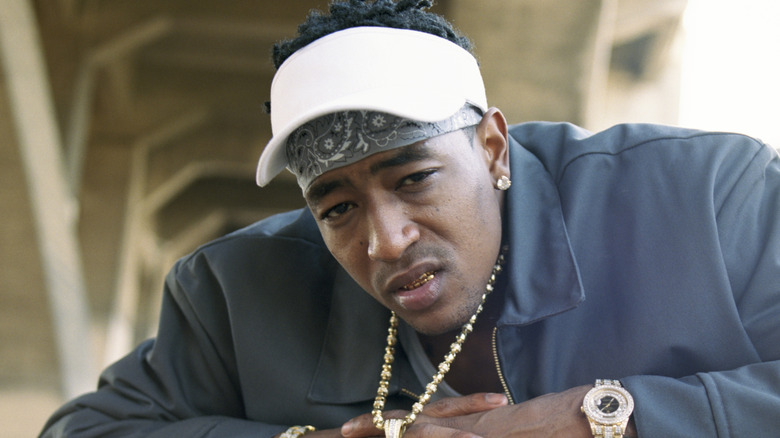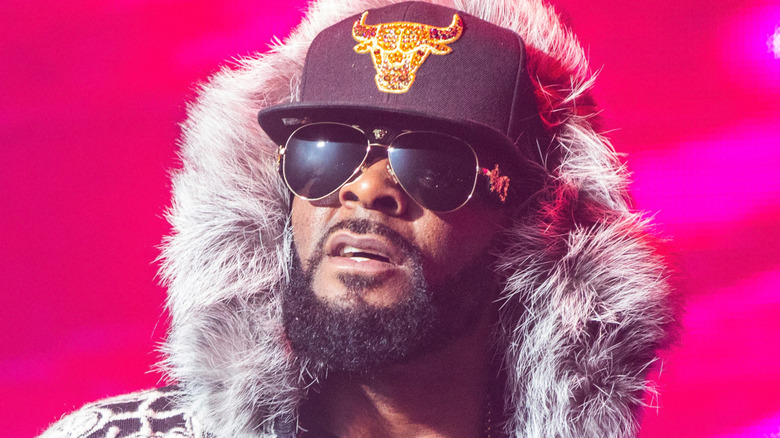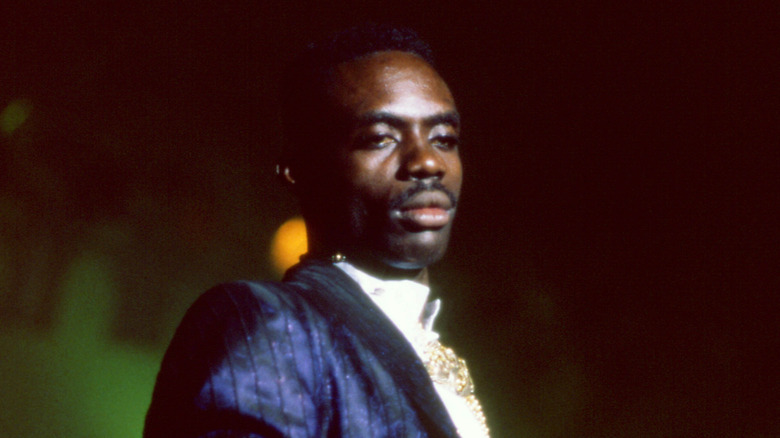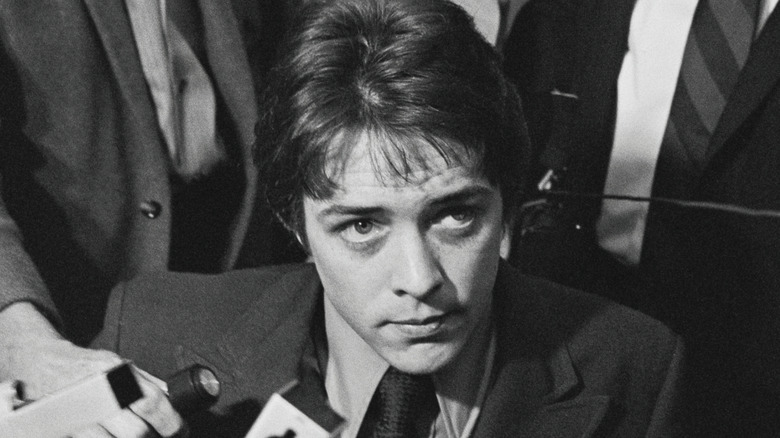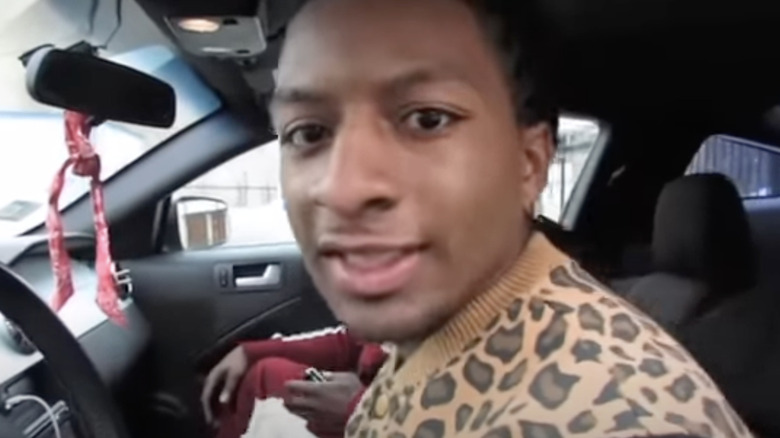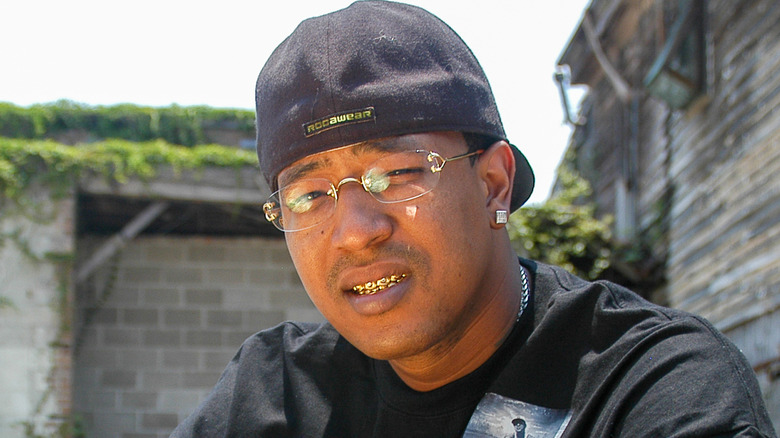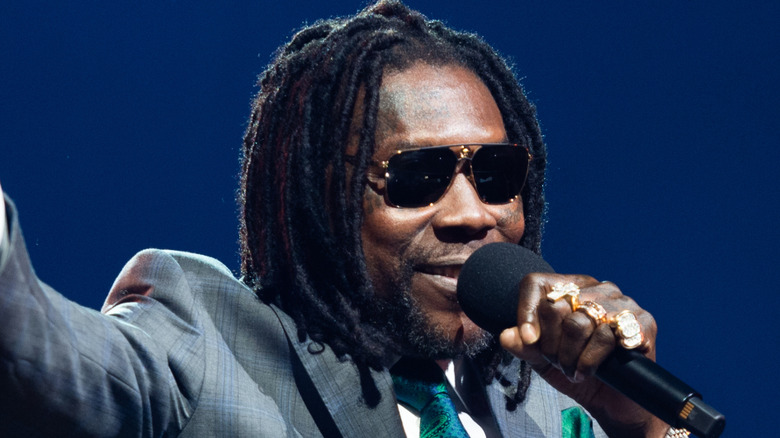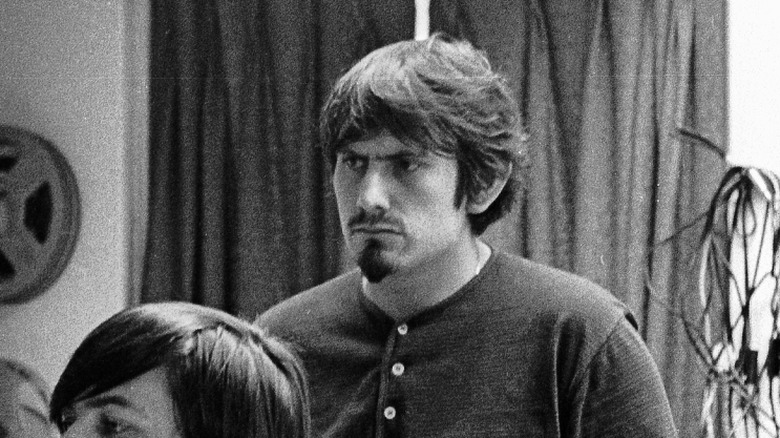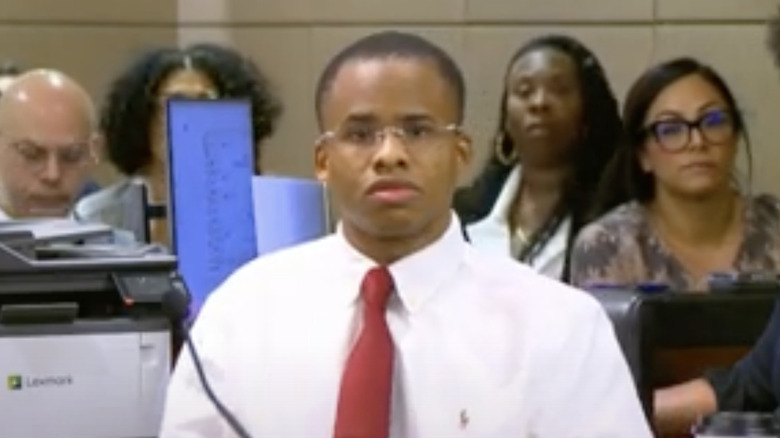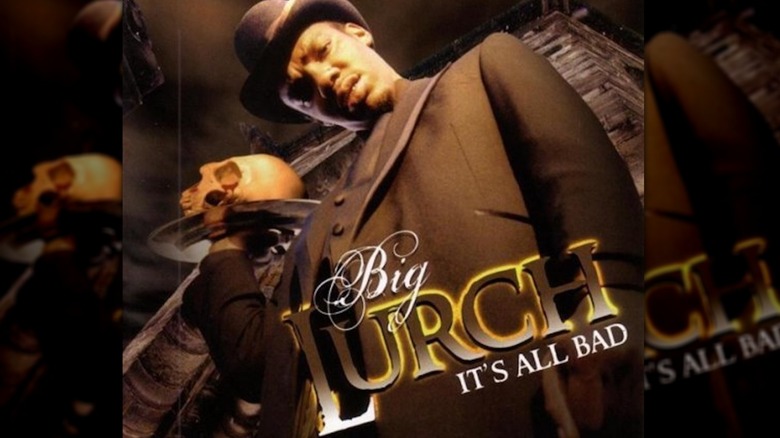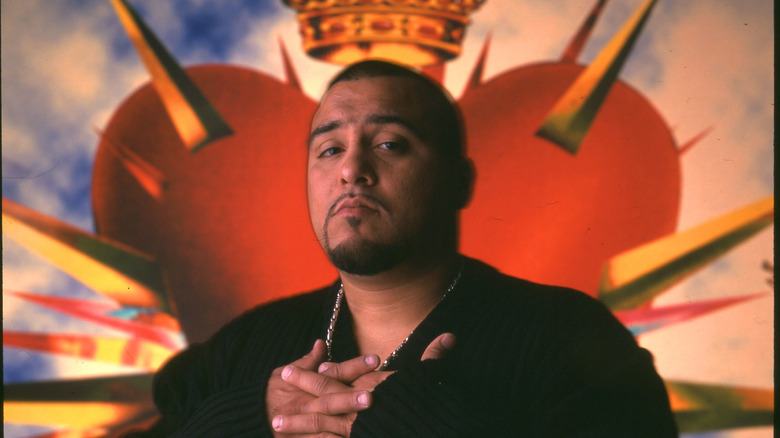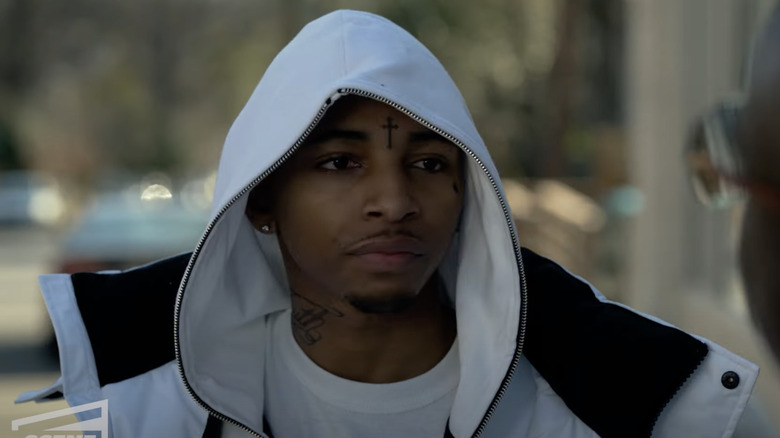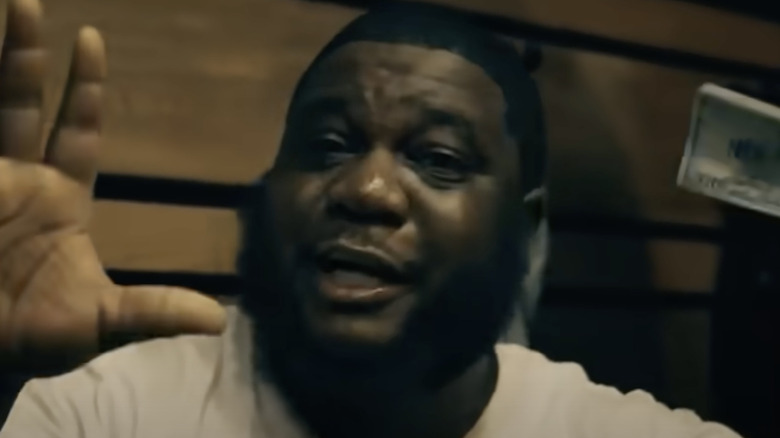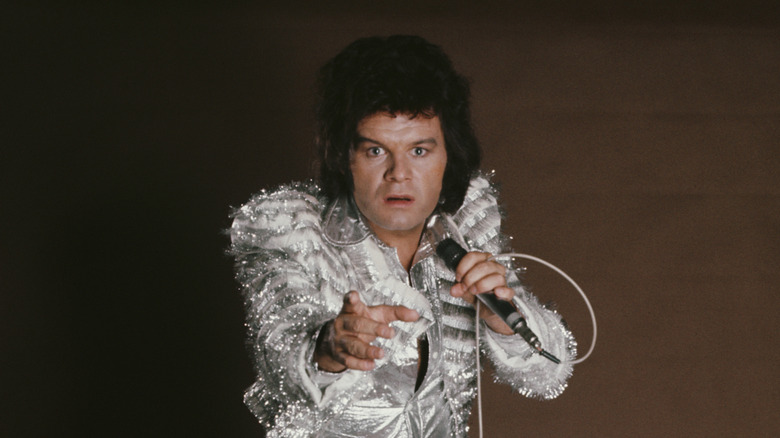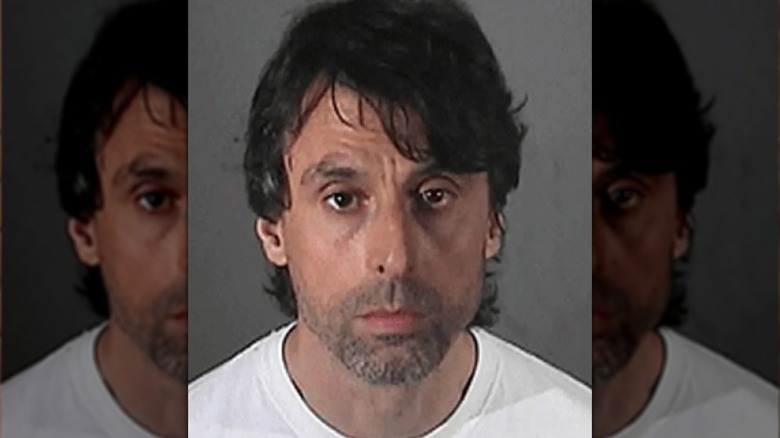Musicians Who Are Likely Stuck In Prison For Life
We may receive a commission on purchases made from links.
Musicians, regardless of whether they're rappers, rockers, or pop singers, afford themselves some privileges in life and society, provided they make it big or develop at least a moderately-sized audience. These talented and skilled song crafters get famous, and then often rich, and they're soon on top of the world. But they are still human beings and regular citizens on some level. Everyone is technically equal in the American legal system, and courts, judges, and juries don't care who the defendant may be, should the crimes for which they're being charged be considered serious and egregious.
Even celebrities of all levels can't get away with certain actions, and, after being subjected to due process, are found guilty of offenses that are violent, shocking, and appalling. The punishment for those lapses in judgment or morality can sometimes mean prison, and for a very long time at that. Here are some rappers, rockers, and singers of note who likely won't be making a big comeback anytime soon on account of how they're stuck behind bars, serving life sentences or terms so long they're not ever likely to taste freedom again.
R. Kelly
A smooth voice, hooks and melodies, and lyrics often fixated on the carnal side of the human experience made R. Kelly an undeniable superstar. In the 1990s and beyond, he sold more than 40 million copies of his albums and scored more than three dozen hits on the R&B chart. The self-styled "King of R&B" crossed over to the top of the pop chart, too, with tunes like "Sex Me," "Bump N' Grind," and "Your Body's Callin'." From the early 1990s on, Kelly also faced allegations of exploitation and abuse of young women.
One strange detail everyone ignored about Aaliyah is how the pop star was coerced into marrying Kelly when she was 15 years old, and in the early 2000s Kelly evaded a prison sentence — despite numerous court hearings — for 30 counts of producing content of an explicit nature that involved minors.
In 2017, after journalist Jim DeRogatis uncovered a cult-like community of women kept by Kelly in his home for his own pleasure, the R&B singer was arrested, arraigned, and tried for a slew of charges. In 2022, a court sentenced Kelly to a 30-year prison term for racketeering and sex trafficking, and a federal court added another 20 years after a guilty verdict on counts of crimes against minors. The terms will be served concurrently; Kelly won't be able to walk out of prison until he's about 80 years old.
Ninjaman
Dancehall is an outgrowth of reggae, both of which emerged from Jamaica. In the 1980s and 1990s, that particular mix of Jamaican musical styles, along with pounding dance beats and hip-hop, took off around the world and made stars out of a handful of practitioners, including Desmond Ballentine, who performed under the name Ninjaman. He imbued his songs — such as "My Weapon," "Above the Law," and "Murder Dem" — with visceral and harrowing lyrics about violence and criminal activity.
A career that included musically documenting violence came to an end when Ninjaman joined the list of musicians who have killed people. In 2009, Ninjaman got into a fight with an acquaintance named Ricardo Johnson. The next day, the musician went looking in Kingston for Johnson, bringing along associate Dennis Clayton, his son Janeil Ballentine, and some guns. The trio gave chase, cornered Johnson, and fired multiple shots, with one going into the victim's side. He died from those injuries, and in 2017, Ninjaman and his accomplices stood trial for murder.
All three were found guilty, and all received lengthy prison sentences. Janeil Ballentine and Clayton were given 15 years behind bars, while Ninjaman received 25 years in a hard labor camp for murder, and then another 20 for the crime of shooting with the intent to harm another person. That makes him eligible for parole in December 2042, when Ninjaman will be 76 years old.
Bobby Beausoleil
A tertiary figure in the Los Angeles music scene of the 1960s, wannabe rock star Charles Manson once connected with the Beach Boys to make a song. His musical career and aspirations fizzled out before long, but Manson maintained connections to many celebrities, including Bobby Beausoleil, a guitarist for the psychedelic rock band the Grass Roots — later known as Love — and heavier and harder bands like Orkustra and Magick Powerhouse of OZ.
When Manson created his small cult of followers called the Manson Family, he predicted a coming race war and ordered his devoted recruits to brutally murder his enemies. Beausoleil became caught up in the organization, and Manson so trusted the musician that he put him in charge of bringing in new devotees. Beausoleil was also given a task that led to the Manson Family's first murder. Beausoleil attempted to get money from an acquaintance and music teacher named Gary Hinman, but after the hours turned to days in which Hinson swore he had no money to give them, the story goes, on Manson's orders, Beausoleil stabbed Hinman to death, and was arrested after police found him driving the victim's car. Convicted of murder and sentenced to death in 1970, Beausoleil's punishment was commuted to life in prison when California did away with capital punishment in 1972.
Young Q.C.
Emerging Chicago rapper Young Q.C. (born Qaw'mane Wilson) took the do-it-yourself approach in order to invite fame and fortune. In 2012, he started heavily populating a YouTube channel with content that included a music video for one of his songs, a dramatic series, as well as clips of himself wandering around Chicago handing out stacks of cash to strangers, showing off a new convertible, and flashing his expensive watches.
His wealth was new, and it was all from a $90,000 sum he'd inherited from his mother, Yolanda Holmes, who had been shot and stabbed by an intruder in her home. Chicago police investigating the murder soon linked Young Q.C. to the crime, alleging that he wanted Holmes dead so he could more quickly acquire the money he'd been bequeathed. The gunman, Eugene Spencer, had only been paid $70 by Young Q.C. to kill his own mother, despite being offered $3,500. Arrested, arraigned, and tried, the rapper was sentenced in 2020 to 99 years in prison for his role in the murder, while Spencer got 100 years.
C-Murder
The commercially dominant style of rap in the late 1990s and early 2000s was the New Orleans sound, as pioneered by the acts on No Limit Records. Created by rapper Master P as an outlet for his own work, one of the biggest No Limit stars was the boss's brother, C-Murder. Born Corey Miller, C-Murder is a one-hit wonder who made millions, reaching the singles charts just once with "Down for My N's," but selling huge numbers of copies of his late '90s albums "Life and Death" and "Bossalinie."
In January 2002, the Platinum Club in the New Orleans suburb of Harvey hosted a rap battle, and C-Murder was an announced competitor. That drew 16-year-old super-fan and aspiring rapper Steve Thomas to the show, who gained entry with a falsified ID. During the evening, a fight broke out that turned into a melee. C-Murder's friends targeted Thomas in the violence, and as they battered the teenager as he lay on the ground, the rapper fatally shot him in the chest. Convicted by a jury of second-degree murder, C-Murder began serving a lifetime prison sentence in 2009.
Vybz Kartel
Dancehall made significant and lucrative inroads into the U.S. mainstream music market in the 2000s. Jamaican-born acts like Shaggy, Sean Paul, and Beenie Man all enjoyed lengthy runs on the pop chart, as did Adidja Palmer, better known as Vybz Kartel. Calling himself "Worl' Boss," he collaborated with singer Spice on the American radio hit "Ramping Shop," which had been banned from airplay in Jamaica on the grounds that it was obscene.
In 2011, Kartel reportedly thought that a close associate named Clive Williams made off with some of his firearms. In retaliation, Kartel and some other members of his entourage murdered Williams and then mutilated the body. Entered into evidence in the musician's trial were text messages explicitly admitting and detailing how they processed Williams' remains. Sixty-five days after legal proceedings began — Jamaica's longest-ever criminal trial — a judge sentenced Kartel to life in prison, with his first parole hearing scheduled for 2049.
Roy Estrada
Every band of the heavily blues-influenced classic rock era needed a bass player, and many of them chose Roy Estrada. Throughout the 1960s and 1970s, Estrada performed with Frank Zappa's Mothers of Invention, but the band was together off and on so much that the many breaks allowed Estrada to help form Little Feat, and then record multiple albums with the project. He also played bass and wrote songs in the capacity of a sideman for solo artists like Captain Beefheart and Ry Cooder.
Demand for Estrada's work dwindled after 1977, the year he was first tried and convicted on a charge of assaulting a child. He served one day behind bars in Colorado, but in 1994 he was sentenced to six years in prison in California on a charge of lewd and lascivious conduct involving a child under the age of 14. After he was paroled, Estrada moved to Texas, and in 2012 he again committed repeated acts of child abuse; the family of the victim didn't know about Estrada's history as a sex offender. The bassist made a deal with Tarrant County prosecutors, and he was sentenced to 25 years in prison. Estrada won't be released until he's 93 years old.
Tay-K
Many rappers have successfully used their criminal pasts as song fodder. Taymor McIntyre, otherwise known as Tay-K or Tay-K 47, got his career going while his criminal activity was very much in the present, releasing "The Race" in 2017. It climbed to No. 17 on the R&B chart and No. 44 on the pop chart. About a year prior, Tay-K was party to a home invasion and robbery in Mansfield, Texas, during which a man named Ethan Walker died. Due in part to how the rapper was a minor at the time, the court placed Tay-K on house arrest, but he removed his ankle monitoring device and fled. During his absence, the rapper then allegedly attacked and robbed a man in Arlington, Texas, and then shot and killed photographer Mark Anthony Saldivar in San Antonio during a camera equipment robbery gone awry.
Captured by U.S. Marshals in New Jersey in mid-2017, Tay-K was sent back to Texas to stand trial. Found guilty of the murder of Walker, the rapper was sentenced to 55 years in prison. While incarcerated, the musician was found guilty of killing Saldivar, which added 80 years to his sentence.
Big Lurch
Taking his name from the also very tall and imposing butler on "The Addams Family," Big Lurch broke out in the late 1990s on "Da Family," the one and only album by the Cosmic Slop Shop collective. While also rapping on often dark tracks featuring stars like Too $hort, Mystikal, and E-40, Big Lurch — aka Antron Singleton — recorded one LP under his own name, "It's All Bad," which hit stores in 2004, a year after he was sentenced to life in prison for a murder conviction.
In April 2002, police in the Watts neighborhood of Los Angeles picked up Big Lurch running and covered in blood. An investigation quickly revealed that the musician had brutally murdered and tortured Tynisha Yates, his apartment roommate. Yates had sustained numerous full bone breaks and fractures, and Big Lurch had even removed and eaten part of her lung. The rapper's lawyer argued an insanity plea due to Big Lurch being under the influence of the dissociative drug PCP at the time of the murder, a substance that he often misused. A jury rejected that defense, and after Big Lurch was found guilty of torture, first-degree murder, and aggravated mayhem, Big Lurch received two consecutive life sentences with no chance of parole.
SPM
When Houston emerged as a respectable and viable hip-hop scene in the late 1990s, it was after South Park Mexican, more commonly known by SPM, worked to make that happen. Named after his nativity to the South Park neighborhood of Houston, the rapper (born Carlos Coy) founded the label Dope House Records to release his first three albums. SPM became one of the top indie rappers in the country in that era, selling 100,000 copies of "The Third Wish to Rock the World" and getting national airplay for singles like "You Know My Name" and "High So High."
Within two years of his artistic and commercial breakthroughs, SPM's career was virtually over in the wake of an arrest, conviction, and lengthy prison sentence. In September 2001, the rapper hosted a sleepover for his daughter, and was later charged with aggravated sexual assault of a child from an incident that transpired that night. In 2002, SPM was fined $10,000 and started serving 45 years in prison.
KR
Marketing himself as a rapper, dancer, and actor, Kaalan Rashad Walker, starred in exactly three projects in 2017 and 2018. After appearing opposite Halle Berry in the early '90s South Central Los Angeles-set period piece "Kings," he landed a prominent role as a ruthless gang member in the 2018 remake of the '70s crime classic "SuperFly." In between those movies, Walker, under the initials-derived stage name of KR, released his debut hip-hop EP, the seven-song set "The Intermission."
Throughout it all, according to the Los Angeles County District Attorney's Office, Walker was "truly a predator," according to People. Beginning in 2013, according to the case against the rapper-actor, Walker utilized social media to reach out to women to offer them non-existent work opportunities in the entertainment industry, and instead assaulted them. In 2022, a jury determined that Walker was guilty of seven counts of crimes of a sexual nature committed against seven individuals. The 27-year-old began serving his 50 years to life sentence immediately.
AR-Ab
An underground rapper who loomed large on the Philadelphia scene of the 2000s, AR-Ab became a local favorite for his appearances at rap battles. His appearances on mixtapes prepared by fellow Philadelphia rapper Cassidy just as the latter was gaining national attention upped Ar-Ab's profile as a performer who was particularly adept at detailing his criminal background (and sometimes present) into harrowing and visceral verses and songs about the drug trade and other dark elements of urban life. He branched out to solo mixtapes before forming the Original Block Hustlaz, both an indie hip-hop label and a performer crew.
While AR-Ab had been arrested and imprisoned before, a November 2019 conviction will likely keep the rapper incarcerated for decades. In November of that year, a federal jury found AR-Ab and three associates guilty of expanding their Original Block Hustlaz label into a criminal enterprise that trafficked in drugs. Under his legal name of Abdul West, the musician was found guilty of conspiracy and distribution of heroin, crack cocaine, and methamphetamine. Seventeen months later, a U.S. District Court judge handed down a sentence of a $5,000 fine and 45 years in prison.
Gary Glitter
With many stomping, catchy, propulsive songs and the sparkly stage looks to match, Gary Glitter championed the glam rock movement of the 1970s. The British musician whose real name is Paul Gadd charted 18 singles in the U.K. Top 40, including "I'm the Leader of the Gang" and "I Love You Love Me More," while in the U.S. he's known almost entirely for the near-instrumental "Rock and Roll (Part 2)," a Top 10 hit in 1973 but which would live on for decades as an excitement-stoking anthem played at sports stadiums and arenas.
It's not played in public so much anymore, not since Gary Glitter's string of arrests and long imprisonments for crimes committed against children. He spent four months in prison in 1999 after computer repair techs found dozens of illegal images on his PC, and then three years behind bars in Vietnam after being convicted of acts against two young girls. Deported back to the U.K., Glitter was sentenced to another 16 years for crimes against underage girls that dated to the 1970s and 1980s, but only served half of that. Paroled in 2023, Glitter was free for just 38 days until he was caught trying to access profane material on the dark web, a parole violation. Denied his freedom by a judge in 2025, unless a parole board grants him release, Glitter will stay locked up until 2031 at the earliest, at which point he'll be 87 years old.
Pete McNeal
A versatile session musician and sideman in the 2000s, Pete McNeal played drums for singer-songwriter Brett Dennen, jazz-pop superstar Norah Jones, Soul Coughing leader Mike Doughty, and Ghostface Killah, a member of the historically troubled Wu-Tang Clan. Also a part of the folk-rock trio the Panderers, McNeal joined the popular quirk-rock band Cake, providing percussion on the band's albums and in live shows from 2001 to 2004.
In 2009, McNeal attended a Thanksgiving party in the Los Angeles enclave of Laurel Canyon. During the visit, McNeal sexually abused a three-year-old child. The musician avoided prison time because his initial trial resulted in a hung jury, but when he was retried, a second jury found McNeal guilty on a charge of copulation with a child under the age of 10. McNeal had once been given probation after the attempted assault of a child during a volunteer stint at a Los Angeles school; for the Thanksgiving crime, the musician earned a sentence of 15 years to life in prison.
The Childhelp National Child Abuse Hotline at 1-800-4-A-Child (1-800-422-4453) or contact their live chat services.
The National Domestic Violence Hotline at 1−800−799−7233. You can also find more information, resources, and support at their website.
The Rape, Abuse & Incest National Network website or contact RAINN's National Helpline at 1-800-656-HOPE (4673).
